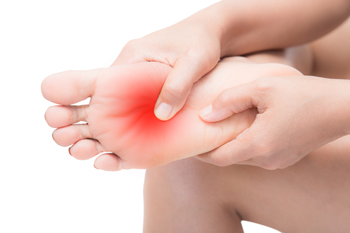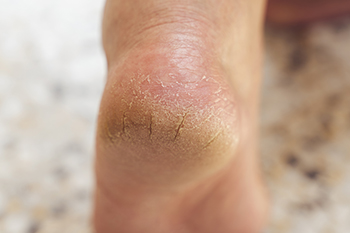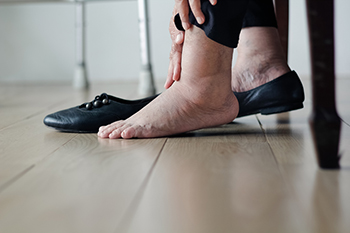Connect With Us
Blog
Items filtered by date: November 2023
About Peripheral Neuropathy

Peripheral neuropathy, a condition where nerves in the body's extremities like feet are damaged, is especially prevalent in those over 55 years old. This nerve damage can affect sensory, motor, and autonomic nerves, leading to symptoms such as numbness, tingling, pain, muscle weakness, and balance issues. Early consultation with a podiatrist is important for symptoms such as foot pain or wounds that are not healing, especially in people at high risk, including diabetic patients. Diabetes is the most common cause of peripheral neuropathy, where high blood sugar levels damage nerves. Other causes can include physical injuries, viral infections, medication side effects, and excessive alcohol use. Treatment varies based on the cause and symptoms. Untreated peripheral neuropathy can cause serious complications like foot ulcers, infections, gangrene, and even amputation. It can also cause heart and circulation issues. If you have symptoms of peripheral neuropathy, it is strongly suggested that you make an appointment with a podiatrist for an evaluation and treatment.
Neuropathy
Neuropathy can be a potentially serious condition, especially if it is left undiagnosed. If you have any concerns that you may be experiencing nerve loss in your feet, consult with one of our podiatrists from American Surgeons Group. Our practitioners will assess your condition and provide you with quality foot and ankle treatment for neuropathy.
What Is Neuropathy?
Neuropathy is a condition that leads to damage to the nerves in the body. Peripheral neuropathy, or neuropathy that affects your peripheral nervous system, usually occurs in the feet. Neuropathy can be triggered by a number of different causes. Such causes include diabetes, infections, cancers, disorders, and toxic substances.
Symptoms of Neuropathy Include:
- Numbness
- Sensation loss
- Prickling and tingling sensations
- Throbbing, freezing, burning pains
- Muscle weakness
Those with diabetes are at serious risk due to being unable to feel an ulcer on their feet. Diabetics usually also suffer from poor blood circulation. This can lead to the wound not healing, infections occurring, and the limb may have to be amputated.
Treatment
To treat neuropathy in the foot, podiatrists will first diagnose the cause of the neuropathy. Figuring out the underlying cause of the neuropathy will allow the podiatrist to prescribe the best treatment, whether it be caused by diabetes, toxic substance exposure, infection, etc. If the nerve has not died, then it’s possible that sensation may be able to return to the foot.
Pain medication may be issued for pain. Electrical nerve stimulation can be used to stimulate nerves. If the neuropathy is caused from pressure on the nerves, then surgery may be necessary.
If you have any questions, please feel free to contact our offices located in Homewood, South Chicago Heights, and Mokena, IL . We offer the newest diagnostic and treatment technologies for all your foot care needs.
Common Reasons Why Cracked Heels Develop

Cracked heels, also known as heel fissures, are a common foot ailment that can be both unsightly and uncomfortable. Several factors contribute to their development. One primary cause is dry skin. The skin on the soles of your feet is naturally thicker, and when it lacks moisture, it becomes less flexible and more prone to cracking. Another factor is inadequate hydration. Dehydration can affect your body's ability to maintain skin elasticity, making it easier for your heels to crack. Additionally, prolonged standing, especially on hard surfaces, can also contribute to this problem, as it puts extra pressure on the heel area and may lead to cracks. Footwear choices play a significant role. Wearing open-back or poorly fitting shoes can increase friction and pressure on the heel, exacerbating the issue. Various medical conditions, such as diabetes or thyroid disorders, can also affect skin health and potentially lead to cracked heels. People may have lifestyle factors such as excessive bathing or exposure to harsh, dry climates which can contribute to developing cracked heels. If you have cracked heels, it is strongly suggested that you visit a podiatrist who can offer you effective treatment options, which may include prescribed medication.
If the skin on your feet starts to crack, you may want to see a podiatrist to find treatment. If you have any concerns, contact one of our podiatrists from American Surgeons Group. Our practitioners can provide the care you need to keep you pain-free and on your feet.
Cracked Heels
It is important to moisturize your cracked heels in order to prevent pain, bleeding, and infection. The reason cracked heels form is because the skin on the foot is too dry to support the immense pressure placed on them. When the foot expands, the dry skin on the foot begins to split.
Ways to Help Heal Them
- Invest in a good foot cream
- Try Using Petroleum Jelly
- Ease up on Soaps
- Drink Plenty of Water
Ways to Prevent Cracked Heels
- Moisturize After Showering
- Skip a Shower
- Keep Shower Water Lukewarm
- Don’t Scrub Your Feet
If you are unsure how to proceed in treating cracked heels, seek guidance from a podiatrist. Your doctor will help you with any questions or information you may need.
If you have any questions, please feel free to contact our offices located in Homewood, South Chicago Heights, and Mokena, IL . We offer the newest diagnostic and treatment technologies for all your foot care needs.
Get Proper Care for a Sports-Related Foot or Ankle Injury This Fall
Ollier’s Disease

Ollier’s disease is a condition where a person develops non-cancerous cartilage growths, called enchondromas, inside their bones. It often affects the bones in the hands and feet, which can cause the bones to become deformed. This can make the hands and feet look abnormal and may lead to problems like shorter limbs, fingers, or toes. Even though these growths start as non-cancerous, there is a small risk they can become cancerous later. People with Ollier’s disease usually have a normal life span, and it does not affect their intelligence. The disease is often noticed in children around the age of 5 and the growths typically stop once they reach early adulthood. If you notice something amiss with your child’s feet, it is strongly suggested that you make an appointment with a podiatrist for a proper diagnosis and treatment.
Some foot conditions may require additional professional care. If you have any concerns, contact one of our podiatrists of American Surgeons Group. Our practitioners can provide the care you need to keep you pain-free and on your feet.
Rare Foot Conditions
The majority of foot conditions are common and can be treated by a podiatrist. Standard diagnostic procedures are generally used to identify specific conditions and treatment can be rendered. A podiatrist also treats rare foot conditions which can be difficult to diagnose and may need extra attention and care.
There are many rare foot conditions that can affect children. Some of these can include:
- Freiberg’s disease
- Kohler’s disease
- Maffucci syndrome
Freiberg’s disease - This can be seen as a deterioration and flattening of a metatarsal bone that exists in the ball of the foot. It typically affects pre-teen and teenage girls, but can affect anyone at any age. Symptoms that can accompany this can be swelling, stiffness, and the patient may limp.
Kohler’s disease - This often targets the bone in the arch of the foot and affects younger boys. It can lead to an interruption of the blood supply which ultimately can lead to bone deterioration. The patient may limp or experience tenderness, swelling, and redness.
Maffucci syndrome - This affects the long bones in a child’s foot leading to the development of abnormal bone lesions. They are benign growths and typically develop in early childhood and the bones may be susceptible to breaking.
A podiatrist can properly diagnose and treat all types of rare foot conditions. If your child is affected by any of these symptoms or conditions, please don’t hesitate to call our office so the correct treatment method can begin.
If you have any questions please feel free to contact our offices located in Homewood, South Chicago Heights, and Mokena, IL . We offer the newest diagnostic tools and technology to treat your foot and ankle needs.
Underlying Medical Conditions and Foot Edema

Swollen feet can arise due to various health concerns, including skin infections and underlying health conditions. For instance, cellulitis is a painful bacterial infection causing swelling, redness, and warmth in the affected region. Particularly vulnerable are individuals with diabetes. They often face complications due to reduced healing ability and decreased sensation, which can lead to unnoticed injuries becoming infected and subsequently causing foot swelling. Another condition, lymphedema, results from impaired lymph flow, often due to damaged or removed lymph nodes. It can be congenital or caused by factors such as cancer treatments or infections. Heart failure, a severe medical condition, results in fluid accumulation, with swollen feet as a common symptom. Prolonged immobility can cause deep vein thrombosis, a potentially life-threatening blood clot. Kidney issues can also lead to swollen feet if fluid balance is disturbed. Additionally, liver disease, especially cirrhosis, can cause fluid accumulation in the lower extremities due to portal hypertension. If you have swollen feet that do not respond to rest, it is suggested that you make an appointment with a podiatrist to identify the root cause of the swelling and get treatment appropriate to what is discovered.
Swollen feet can be a sign of an underlying condition. If you have any concerns, contact one of our podiatrists of American Surgeons Group. Our practitioners can provide the care you need to keep you pain-free and on your feet.
Swollen feet are a common ailment among pregnant women and people who stand or sit for extended periods. Aging may increase the possibility of swollen feet and patients who are obese often notice when their feet are swelling too. There may be medical reasons why swollen feet occur:
- Phlebitis - A condition that causes the veins to become inflamed and can also cause leg pain.
- Liver disease - This may lead to low blood levels of albumin which is a protein. This can cause fluid in the blood to pass into the tissues and several areas of the body can become swollen.
- Heart failure - When the heart doesn’t pump properly the blood that is normally pumped back to the heart can pool in the veins of the legs causing swollen feet.
- Kidney disease - One of the main functions of the kidneys is releasing excess fluid in the body. This type of condition can make it difficult for the kidneys to function properly, and as a result the feet may become swollen.
- Deep-vein thrombosis (DVT)- This is a serious condition where blood clots form in the veins of the legs. They can block the return of blood from the legs to the heart which may cause the feet to swell. It is important to be treated by a podiatrist if this condition is present.
Swollen feet can also be caused by bone and tendon conditions, including fractures, arthritis, and tendinitis. Additionally, there may be skin and toenail conditions and an infection may cause the feet to swell. Patients who take medicine to treat high blood pressure may be prone to getting swollen feet.
Many patients elevate their feet to help relieve the swelling and this is generally a temporary remedy. When a podiatrist is consulted the reason behind the swelling can be uncovered and subsequently treated.
If you have any questions please feel free to contact our offices located in Homewood, South Chicago Heights, and Mokena, IL . We offer the newest diagnostic tools and technology to treat your foot and ankle needs.

